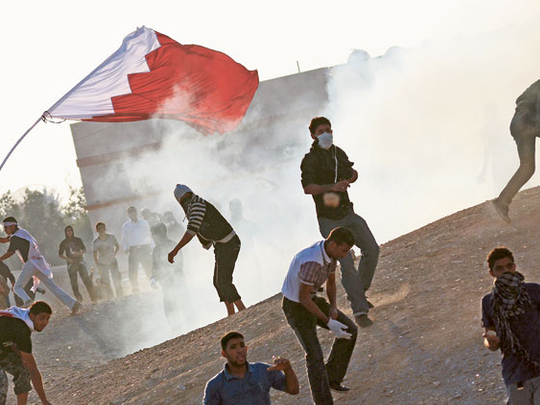
Manama: Mohammad Sultan says that he can no longer venture outside his home in the evening in Daih, in the outskirts of Manama.
"The risks that I get caught in the clashes between protesters and the anti-riot police are too high," the young accountant said. "It has been a very, very difficult year and I pray, sometimes without real conviction, that next year will be much better. I had anticipated a wonderful 2011, especially after I got married, but the social and economic situation was bad and, what is worse, may continue well into 2012. Many shops in the complex where I work have shut down. I am grateful that I still have my job," he said.
Mohammad's story is mirrored by many other people working in Bahrain and who have had difficult situations in a year that saw unprecedented levels of clashes with the police, standoffs between political societies and segments of the society, the imposition of emergency laws, the trial of hundreds of people and the loss of jobs and college seats.
‘Great hopes'
According to business figures, Bahrain's economy has lost more than BD550 million (Dh5.317 billion) between February and December. Several small and medium enterprises have been badly hit, the tourism business is suffering and the real estate sector is down by 40 per cent.
"The year started off with great hopes for a vigorous year and a reinvigoration of civil society dynamism," Jaber Mohammad, a political analyst, said.
"When people demanded more rights in February, most of the people aspiring for better living conditions went along with the movement. But when it was geared towards specific ideologies, there was a chasm that kept widening until it took an ugly sectarian shape with radicals fuelling it.
"Now, as we get ready to welcome a new year, we are sadly a divided nation and with a highly challenging economic situation," he said. The year was highly dramatic for the island kingdom and witnessed massive protests for reforms that degenerated when some groups calling for the downfall of the regime and the establishment of an Islamic republic sought to bring the country to a standstill.
Under the state of national safety, emergency laws, was declared in mid-March and troops from the Peninsula Shield, the military arm of the Gulf Cooperation Council (GCC) were brought in.
Healing process
In a flurry of unsuspected counter-reactions, hundreds of people lost their jobs, students were suspended and businesses were boycotted.
King Hamad Bin Eisa Al Khalifa in June lifted the emergency laws and called for a national dialogue to heal the widening sect-based wounds. The main opposition wavered before it accepted to join and then withdrew. The impasse remained. In late July, the Bahrain Independent Commission of Inquiry (BICI), set up by King Hamad to look into what happened in February and March and why it happened, started its investigations that culminated in a searing report on November 23 that put both the government and the opposition to task.
The government accepted it and started the implementation of some recommendations. The opposition believes that the steps are selective and too slow.
On Saturday, the National Unity Rally warned against a spiral of violence and clashes following attacks on homes in Hamad Town, 18 kilometres south of the capital, Manama.
"Obviously in such a climate, we tend to be pessimistically optimistic about 2012," Jaber Mohammad said.












